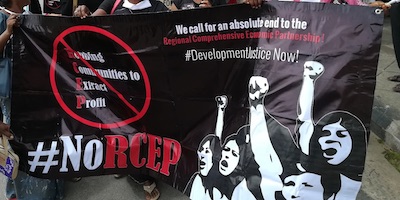24-Jul-2017
Asian Tribune
Officials from ASEAN member states and other countries meeting in India this week for negotiations on the Regional Comprehensive Economic Partnership (RCEP) should take steps to ensure that the trade deal safeguards human rights, Southeast Asian lawmakers said today.
28-Jul-2017
People’s Forum against FTAs and RCEP
“Tell us at least now who gains from RCEP,” People’s Forum challenges the Indian government as the 19th round of RCEP negotiations comes to an end
7-Sep-2017
People over Profit
Philippine civil society groups and social movements stand together to oppose RCEP
5-Jan-2018
Strategic Review
After 30 years of neoliberal globalization, it has been increasingly acknowledged that austerity, privatization, deregulation of finance, markets and corporations, and trade and investment liberalization have had a devastating and discriminatory impact on women.
5-Feb-2018
Business Mirror
As the Trans-Pacific Partnership (TPP) made significant headway in January, negotiating countries in the Regional Comprehensive Economic Partnership (RCEP) are pressured to conclude the trade deal, and they try to make progress in the ongoing talks in Indonesia.
3-May-2018
Friends of the Earth Australia
The ISDS system impedes on national sovereignty to the benefit of corporations, yet places no obligations on investors to behave responsibly, creating an asymmetric system that gives multinationals the same rights as sovereign states.
5-Sep-2018
Financial Express
New Delhi won’t not take additional commitment on intellectual property rights beyond the TRIPS agreement it has already accepted at the WTO; investor-state dispute settlement (ISDS) mechanism only for limited sectors.
10-Sep-2018
Business Standard
In a bid to fast-track the deal, most nations have agreed to ease the investor-state-dispute settlement (ISDS) clauses.
31-Jul-2019
Scoop Politics
There is a high risk that New Zealand would still allow the investor to sue New Zealand in this expensive and discredited system of international investment arbitration

























